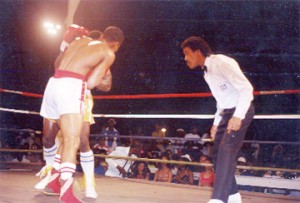By Eion Jardine
The biggest thing that boxing has taught me is that perception is reality in that how you conduct your life is how you are going to be perceived.
I have also learnt that in boxing there are three types of officials outstanding, good and regular.
What separates these three categories of officials is concentration and competence, what I call the two Cs.
The exceptional official has the ability to concentrate for 180 seconds (one round) before resting.
Concentration is one of the most difficult skills to acquire.
Not many persons in a room full of people listening to a speech can repeat what the speaker would have said in the last two minutes of that speech.
One would probably find that many persons in that room were thinking of something else.
In boxing, the official does not have that luxury of allowing his concentration to waver. His mind simply cannot wander, cannot be anywhere else but on what is happening in the ring. Boxing is dangerous. A fighter can be seriously injured in a split second and therefore the third man in the ring must be especially vigilant.

If you are scoring a fight and you know who is winning the round and your concentration wavers, then you would have to guess what happened.
This is what makes the difference between an exceptional official and a good one.
Concentration
Concentration does not come by accident but by training. A Commissioner or Director of Bouts (as he is also known) although in charge of the bout and is required to score the bout also has other chores to perform. This makes it almost impossible for him to view the entire fight.
The only persons required to concentrate fully throughout the duration of a fight are the judges.
There are a few tips that can help improving concentration.
When you are officiating in a bout it helps to have something in your mouth like chewing gum. On other occasions speaking to yourself helps.
In boxing things (such as rules) change constantly and you must be updated to be an exceptional official.
That way if you are one of those persons who give two points for a knockdown you will be safe.
For example, in a fight Boxer `A’ is winning you think on a 10-9 score. But Boxer `B’ knocks Boxer `A’ down. Immediately you think of a 10-9 score for Boxer `B’.
Remember you should give two points for a knockdown after three rounds and one point before three rounds. You must be fair to the other boxer.
In general a referee’s good instinct tells him what to do even before his mind does.
Let’s say a champion is fighting in his hometown. The final round arrives and the fight is even on the judges’ cards.
What to do? The pressure is there to probably give a hometown decision.
This is the moment when incompetence is separated from competence, children from men and women, officials from fans, the weak from the strong, and the honest from the dishonest.
Judges cannot shy away from situations like these. A judge has to settle in his pants, concentrate and vote with a clear conscience, letting himself go by what he really appreciated and forgetting who the champion is and where the match was taking place.
This is the crucial moment for the officials.
What makes an official competent?
Omitting the requisite character trait of honesty which shall be taken for granted the most essential are impartial valuation, serenity a healthy body and mind and good judgement.
All officials will make mistakes; the efficient ones are the ones who make fewer mistakes.
The referees should always anticipate the action and development of the fight; think of a possible accidental head butt and its ruling; the three knock downs in a round that sometimes is in effect but not always; the ruling which governs the use of the mouth piece during the fight; the possibility of a slip or push, instead of a knockdown.
Three malignant traits in boxing are illegal blows, uneven fights and unfair decisions.
This plague of unfair decisions seems to be eternal they frequently provoke the anger of thousands of spectators.
The appointment of competent officials well versed in the rules and regulations of the organization for which they work for; employing officials who are not easily frightened when making decisions; and sending officials to participate in occasional courses either oral or through circulars can help.
To be a referee you really have to live it and feel a great attraction towards refereeing.
You do not have to love boxing that much. As a matter of fact, it is not good for a referee to be a boxing fan.
I have been a referee for the past 32 years. There are some reasons for this.
One is that the profession is a challenge. It requires great mental and physical ability, skill and expertise, that only a few boxing personnel possesses.
Not many persons are capable of becoming competent referees maybe because of their temper or judgement.
A referee knows that his profession consists of a small and select group of men that can go into the ring inspiring respect and command from the boxers and corners.
No one that is not a competent referee can assume the command of the fight, make decisions on the spot and do them accurately.
There is something else that you certainly do not know. A referee has more power than the president of the boxing board of control.
He can disqualify one or both boxers and the president cannot veto those decisions.
All of us officials have a real desire to do well. I can only give suggestions on how you can be better.





